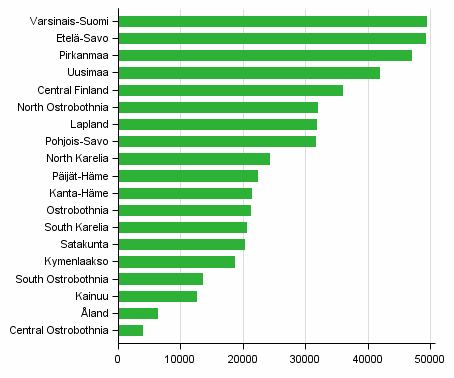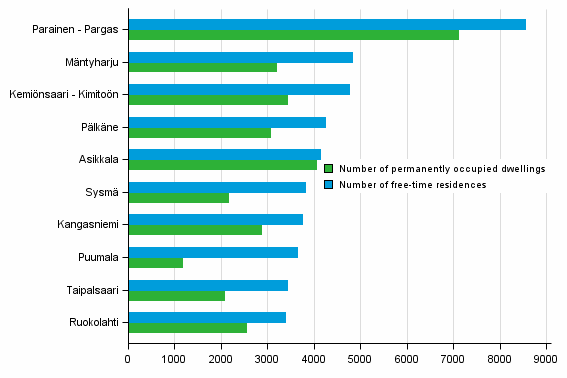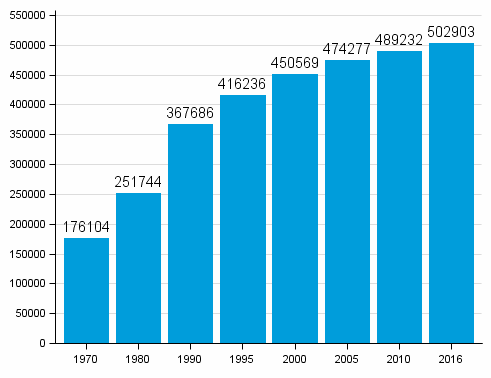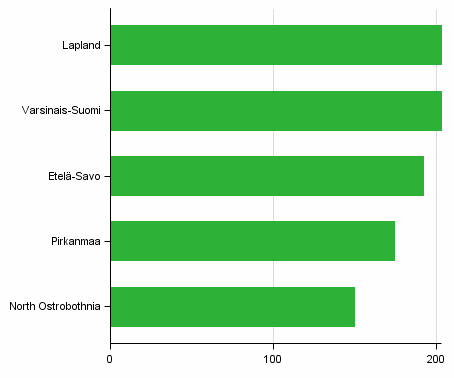Free-time Residences 2016
Varsinais-Suomi was the region with the highest number of free-time residences in 2016
According to Statistics Finland, there were over half a million free-time residences in Finland in 2016. Varsinais-Suomi was the region with the highest number of free-time residences in 2016, around 49,400 free time residences. The number of free-time residences also exceeded 45,000 in the regions of Etelä-Savo and Pirkanmaa. The regions of Central Ostrobothnia (3,900 free time residences) and Åland (6,400 free time residences) had the lowest numbers of free-time residences.
Figure 1. Free-time residences by region 2016

The density of free-time residences in the municipality can also be described by comparing their number with that of permanently occupied dwellings. Then the municipalities richest in free-time residences were places that had a relatively low number of population and a high number of free-time residences. At the end of 2016, altogether 63 municipalities had more free-time residences than permanently occupied dwellings. Such municipalities were Parainen, Mäntyharju, Kemiönsaari and Pälkäne. As the number of permanent residents decreases, the number of free-time residences may become emphasised in ever more municipalities. From 2000 onwards, the number of municipalities with a majority of free-time residences has increased approximately by twenty, when the situation is viewed with the present division of municipalities of 2017.
Figure 2. Municipalities with more free-time residences than occupied dwellings in 2016 (municipalities with the highest number of free-time residences)

Stock of free-time residences grew fastest in the 1980s
There were 502,900 free-time residences in Finland at the end of 2016. The number increased by 1,307 from the previous year. The stock of free-time residences does not grow direct due to newbuilding because some free-time residences area converted into permanent dwellings or their active use is discontinued. The number of free-time residences grew fastest in the 1980s. In 1990, there were 368,000 free-time residences, which was 46 per cent more than in 1980. From 1970 to 1980, the increase was 75,600, or 43 per cent.
Figure 3. Number of free-time residences 1970–2016

The rate of construction of free-time residences has been slowing down steadily since the early years of the 1990s. Whereas roughly 8,000 free-time residences were built every year in the early 1990s, in recent years the number has been 2,000–3,000 free-time residences per year. Through the 1990s, the stock of free-time residences grew by around 20 per cent. This is clearly by less than in the 1970s and 1980s, when the stock increased by over 40 per cent per decade.
About 2,000 new free-time residences completed per year
Over 4,000 new free-time residential buildings have been completed per year in the 2000s. Nowadays they are completed less and less free-time residences per year. For example 2,000 new free-time residential buildings were completed in 2016 (according to statistics of buildingstock).
During 2016, the highest numbers of new free-time residences were built in Lapland, Varsinais-Suomi and Etelä-Savo. By municipality, the highest numbers of new free-time residences were built in Savonlinna, Kuusamo and Parainen: over 40 free-time residences in the year in each municipality.Figure 4. Regions with highest numbers of new free-time residences built in 2016

Building of free-time residences liveliest in Lapland, Etelä-Savo and Varsinais-Suomi
In the 2000s, the highest numbers of free-time residential buildings have been completed in general in Lapland, Etelä-Savo and Varsinais-Suomi, where their number has grown by over 400 per year.
Since 1990 the stock of free-time residences has grown most in Etelä-Savo, where it has increased by approximately 14,000. The stock has changed least in Central Ostrobothnia and Åland where the number of free-time residences has increased by over 1,500 since 1990.
Summer residence densest in Kustavi and Kaskinen
Free-time residences are densest in the municipality of Kustavi and Kaskinen with average 15–18 free-time residences per square kilometre of land. In eight municipalities there are more than ten free-time residences per square kilometre. In the whole country there are, on the average, 1,7 free-time residences per square kilometre. Varsinais-Suomi, Uusimaa, Päijät-Häme, Kanta-Häme and Åland have more than four free-time residences per square kilometre. In North and Central Ostrobothnia, and Kainuu and Lapland there is average less than one free-time residence per square kilometre. In proportion to the land area, Kauniainen, Savukoski, Enontekiö and Utsjoki have the lowest number of free-time residences.
Average floor area of free-time residences 48 square metres
New free-time residences are larger in floor area than before. The average floor area of free-time residences built in the 2010s was 72 square metres and the median 65 square metres. The average floor area of free-time residences built in 2000 to 2009 was 65 square metres and the median 56 square metres. The average floor of all free-time residences was 48 square metres in 2016. The known square metres of free-time residences are included in the average floor size (the floor area of around 17,000 free-time residences is unknown). Large free-time residences and buildings used as leisure-time housing increased the average size to some extent, as the median floor area of all free-time residences was 40 square metres. Thus, one-half of free-time residences still have a floor area of 40 square metres or less. The share of large free-time residences with a floor area of at least 60 square metres was 25 per cent of all free-time residences in 2016. In 1970, the share of such large free-time residences in the stock of free-time residences was 15 per cent.
Table 1. Free-time residences by floor area in 2016
| Floor area, m2 | Number of free-time residences | % |
| Free-time residences, total | 502 903 | 100,0 |
| – 19 | 45 919 | 9,1 |
| 20 – 39 | 180 331 | 35,9 |
| 40 – 59 | 135 241 | 26,9 |
| 60 – 79 | 64 081 | 12,7 |
| 80 – 99 | 30 348 | 6,0 |
| 100 – | 29 721 | 5,9 |
| Unknown | 17 262 | 3,4 |
| Average floor space | 48 | . |
| Median floor space | 40 | . |
The latest information of the summer residents, the owners of the cottage and the length of the cottage trip will be published in the Midsummer week in the weblog of Statistics Finland.
Source: Buildings and Free-time Residences, Statistics Finland
Inquiries: Marja Hermiö 029 551 3211, Arja Tiihonen 029 551 3272, info@stat.fi
Director in charge: Jari Tarkoma
Updated 24.5.2017
Official Statistics of Finland (OSF):
Buildings and free-time residences [e-publication].
ISSN=1798-6796. 2016,
Free-time Residences 2016
. Helsinki: Statistics Finland [referred: 17.2.2026].
Access method: http://stat.fi/til/rakke/2016/rakke_2016_2017-05-24_kat_001_en.html

